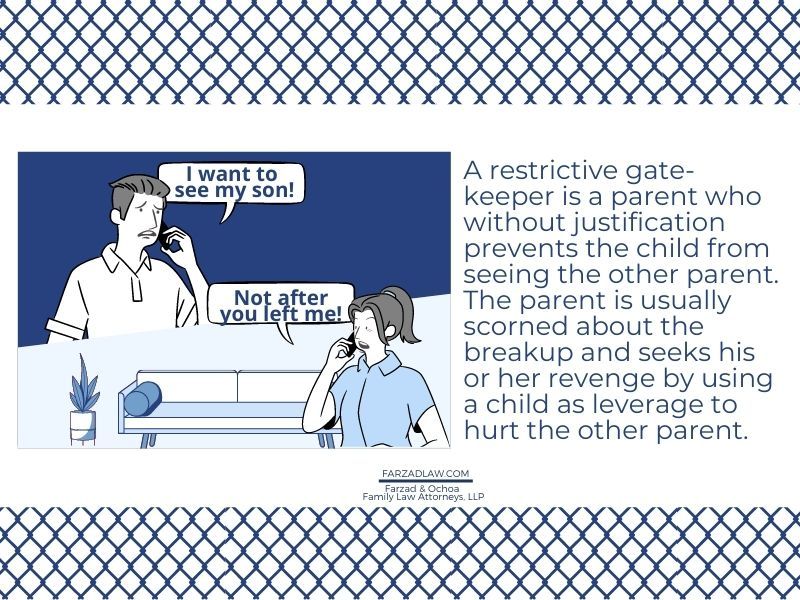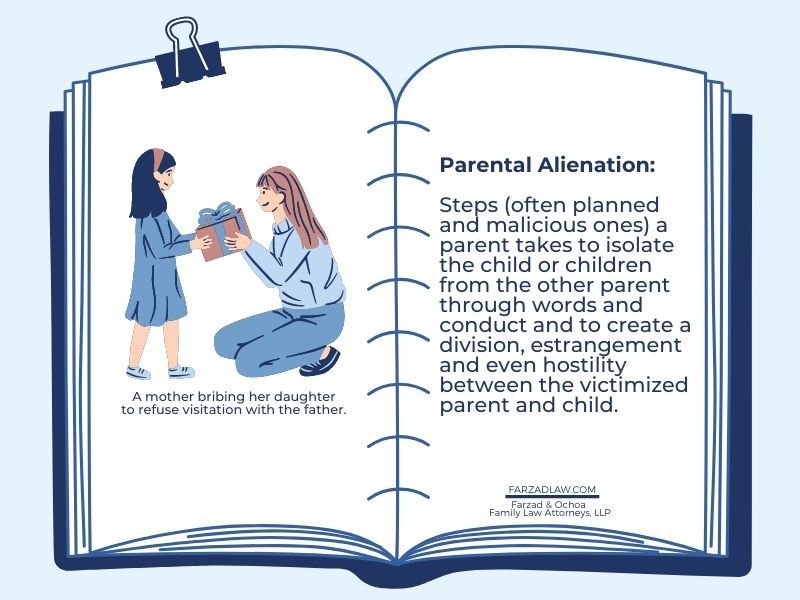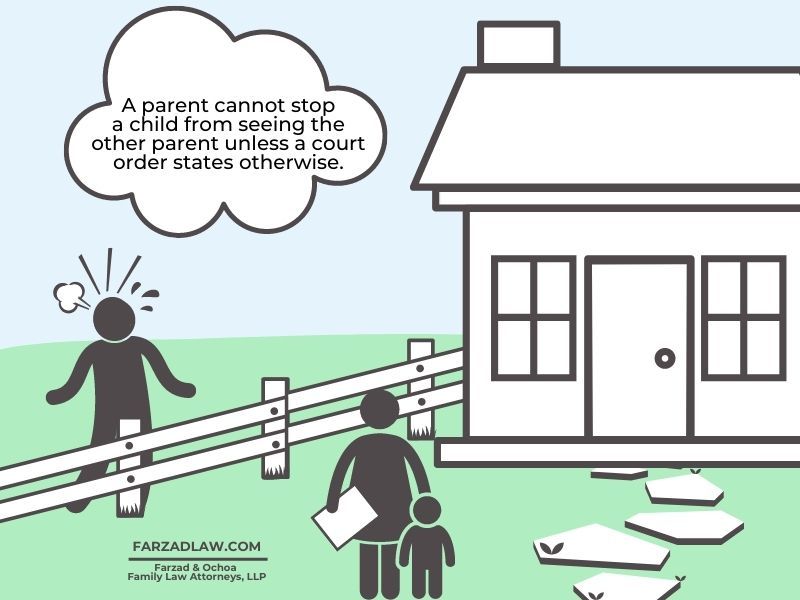Keeping a Child Away from the Other Parent Can Backfire and Here is How
If you find two parents with a young child or children who are separating, you will likely find one parent asking whether the other parent can keep the child from them. Who asks this question? The parent whose parenting time is frustrated by the other parent.
What is the answer? The answer is usually no; a parent cannot stop a child from seeing the other parent unless a court order states otherwise. And what is more, keeping a child away from the other parent can seriously backfire. This issue often comes up in the following situations.
- The parents (whether married or unmarried) are no longer together, and the child resides with one of them. The parent with whom the child lives limits contact between the child and the other parent.
- The parents have an existing child custody and parenting time order. However, the child refuses to see one parent, and the parent who does not see the child has reason to believe the other parent is encouraging this misbehavior.
- The parents have an existing court order, and one parent is violating it by interfering with the other parent's parenting time.
Let's get started.
Be serious about parenting. This is not a game. Complaining about the other parent keeping the child from you may fall on deaf ears if you are not capable, ready and willing to spend quality time with your child.
The following are the three main topics we cover.
- First, stopping a child from seeing the other parent when there is no court order.
- Second, stopping a child from seeing the other parent when a parent claims it is the "child's choice."
- Third and finally, stopping a child from seeing the other parent in violation of a court order.
Click on each image to jump ahead.
Can a parent stop a child from seeing the other parent when there are no court orders?
We call this gate-keeping, and two types fit what we write about in this article.
Protective gate-keeping
Parents who have reasonable concerns about the other parent may engage in protective gate-keeping.
- They do stop a child from seeing the other parent but not because of nefarious reasons.
- They do so because of reasonable concerns grounded in facts.
The key to this is the facts.
A parent without a court order technically cannot stop a child from seeing the other parent. He or she may still have concerns regarding the following.
- Substance abuse,
- Lack of anger management (especially if it amounts to abuse), and
- Lack of parenting skills.
A parent who without reasonable justification stops a child from seeing the other parent often does so due to his or her own immaturity or nefarious intent. The gatekeeping results from the restrictive parent's obsession with control or simply unresolved anger against the other parent.
There is no perfect parent standard
What if the mother believes the father does not have her level of parenting skills? However, the father is otherwise capable of caring for the child without endangering the child. Is the mother's basis to stop a child from seeing the other parent unjustified? Yes, it is.
Through our extensive experience in child custody cases, we could probably give you over 50 examples of justified, protective gate-keeping and 50 more that were not.
Justification however still does not give a parent a legal basis to stop the child from seeing the other parent. The concerned parent should immediately seek appropriate child custody and visitation orders and bring his or her concerns to the court's attention.
The parent whose contact is unreasonably prevented or limited should not stand idly by and do nothing. If he or she does nothing, the parent may establish a status quo. The status quo may make it more difficult for the court to change it in the short term.
That parent should also seek immediate child custody and visitation orders.
What is a restrictive gate-keeper?

A restrictive gate-keeper is a parent who without justification prevents the child from seeing the other parent. The parent is usually scorned about the breakup and seeks his or her revenge by using a child as leverage to hurt the other parent.
This type of restrictive parent may also make false allegations of abuse or neglect against the other parent.
- Restrictive gate-keepers are not necessarily terrible parents.
- Despite their parenting skills, they have little respect for the other parent's role in the child's life.
Such parents engage in disparagement of the other parent or the other parent's family or friends to the child.
- Sometimes they do this directly to the child.
- Sometimes they ensure the child sees or overhears communication intended to disparage.
- They rarely co-parent without unreasonable conditions that satisfy their need for control.
Grandparents will sometimes become co-conspirators in the restrictive gate-keeping
We commonly see such parents defer to their parents (the child's grandparents) for help with the gate-keeping. The grandmother or grandfather then becomes a gate-keeping vehicle that assists the alienating parent throughout the process.
When a restrictive parent stops the child from seeing the other parent, court action becomes urgent. A gate-keeper is not a parent who reasonably believes they should limit contact. He or she is a parent who is often intent on destroying the other parent's relationship with the child.
- If the other parent does not take immediate court action, that parent empowers the restrictive parent to continue.
- The inaction often results in the bond between the other parent and the child to break.
This happens because the other parent spends limited or no time with his or her child.
When confronted with the restrictive gate-keeper, seeking joint custody is sometimes a mistake
Setting forth the restrictive gate-keeper's misconduct may justify asking the court for primary or even sole custody. Until the restrictive parent shows a willingness to co-parent and become reasonable, this may be the only reasonable option.
If the court does not grant your request, you will have at least set a precedent for it. Therefore, if you revisit it later, you may remind the court this was the concern you shared earlier, and it remains a concern.
All of this assumes you are the parent with the necessary parenting skills. It also assumes you have the time to dedicate to the child's care.
How can keeping a child from the other parent backfire if there are no court orders?
Just because there are no court orders does not mean a parent can frustrate the other parent's time with the child. The parent whose time was unreasonably frustrated has several options:
- The parent can ask the court for primary physical custody of the child or children. Frustration of parenting time is a factor the court takes into consideration when it makes custody orders. In extreme cases, especially those that involve abduction or concealing of the child, sole custody may be an appropriate request.
- The parent can ask the court to order the other parent into parenting or co-parenting classes. Some parents who keep a child from the other parent do so due to their own immaturity or failure to understand how such behavior actually hurts the child. Parenting or co-parenting classes can help.
- California Family Code 271 is designed to punish bad behavior by ordering a spouse or parent to pay the victimized parent's attorney fees if the unreasonable parent engaged in litigation misconduct. Keeping a child from the other parent, taking unreasonable positions during a custody case and forcing litigation and court proceedings are all sanctionable under section 271.
Can a parent stop a child from seeing the other parent by claiming it is the child's choice?
This part of the article is not about a situation where a child does not want to see the other parent for legitimate reasons. Such reasons include abuse or severe neglect. Instead, we write about those situations where a parent improperly influenced the child not to see the other parent.

To understand how and why this happens, a parent must understand parental alienation. Parental alienation is a common tactic by one parent who intends to significantly harm and even destroy the other parent's relationship with the child. From our article titled "What is Parental Alienation and What Can You Do About it?" (linked below), here is our definition.
"Alienation, by definition, means to isolate one thing from another. In the case of parental alienation, it means steps (often planned and malicious ones) a parent takes to isolate the child or children from the other parent through words and conduct and to create a division, estrangement and even hostility between the victimized parent and child."
There is little a parent can do to stop the alienation absent a court order. The way to stop it is for one of the following to occur.
- The alienating parent voluntarily changes his or her behavior, which rarely happens, or
- The victimized parent obtains a court order that takes custody away from the alienating parent.
We encourage you to read our articles on parental alienation as it will provide you with a proper strategy on how to document the misconduct. It will also teach you how to seek appropriate court orders to put an end to it.
We are skeptical of the "child's choice" claim some parents make. If the parent who is not seeing the child caused significant harm to the parent-child relationship, then a judge may see the child's choice as one that has evidentiary support.
However, absent that, there has to be another explanation and it is often parental alienation and interference with the parent-child relationship.
Children just do not, without a specific explanation, stop caring for and desiring to spend time with a parent. That effect has causes.
Additional articles you will enjoy
Can a parent stop a child from seeing the other parent by refusing to follow a court order?

The short answer is no; a parent cannot lawfully stop the child from seeing the other parent in such a circumstance.
- Court orders are not suggestions.
- They direct parents to comply with them.
- A parent who refuses to comply with a child custody order and stops a child from seeing the other parent violates the court order.
As I write this article, our law firm just won a contempt action, and the judge found the mother guilty of over 20 counts of contempt for her failure to abide by a child custody order.
Such action must be the measure of resolve by a parent who does not see his or her child as a result of the other parent's violations of an order.
To read more about contempt, check out our informative guide about family law contempt actions linked later in this article.
Are there situations a parent, despite a court order, should stop a child from seeing the other parent?
If there is child abuse or other conduct by the other parent that endangers the child's health or safety, a parent may take lawful steps to prevent the visitation.
However, absent extreme circumstances, a parent usually has the option of contacting the proper authorities including the police or child protective services. Also, if there is an immediate threat of harm to the child, a parent may seek emergency child custody relief.
To learn more about emergency court orders, read our article titled, Ex Parte Divorce and Ex Parte Custody Orders Are About Real Emergencies.
How can keeping a child from the other parent backfire if there are court orders?
We discussed contempt earlier and that is the most severe remedy against a parent who violates a court order. Contempt can carry fines, community service, and even jail.
But in addition to a contempt action, keeping a child from the other parent in violation of a court order can also backfire by losing custody of the child. This can happen even if the parents share near equal or equal parenting time, such as a 50/50 custody schedule.
A parent who violates a custody order does not act in the best interests of a child. Such a parent is either reckless or dangerous to a child's needs. Courts can and do take custody away from such parents depending on the severity of the misconduct.
Contact us for an affordable strategy session
Our attorneys do not have patience with a parent who unjustifiably interferes with the parent's parent-child relationship. Some of these malicious, interfering parents know they have no grounds to seek court orders to restrict or eliminate parenting time so they engage in self help. They count on the fact the victimized parent will not act.
Unfortunately, many times, the malicious parent is right. Too many fathers and mothers do not take these issues seriously enough and lose out on quality time with their children.
It takes courage to take action.
Through that courage and action, you can stop a parent's unlawful or improper interference.
When you have the courage, what do you do? You contact us.
There is no substitute for legal advice from and representation by an experienced California family law attorney.
We believe good men and women deserve great family law representation. Contact us for an affordable strategy session.
Your Strategy Session
About your strategy session
Southern California Offices
Locations
Our Services and Fees
Frequently asked questions
Strategy sessions are designed for the serious parent. We know how important your children are to you. Their health, safety and best interests are our priority.



